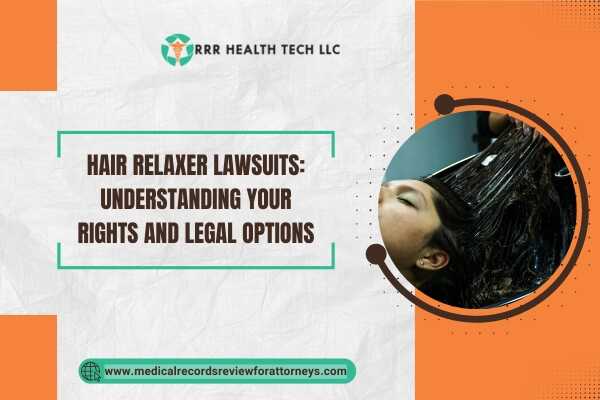
Introduction
Hair Relaxers are chemicals used to make naturally curly or wavy hair straight. On the other hand, recent studies show that hair relaxers aren’t safe to use as they cause serious issues such as cancer and reproductive problems. Because of this, more and more people are suing hair relaxer companies. This article will discuss hair relaxer lawsuits in details, the reasoning behind legal claims, along with other important elements such as medical record review.
Understanding Hair Relaxers and Their Risks
What are Relaxers?
• Hair relaxers are chemical alters used to transform hair into straighter strands. These products contain a variety of strong ingredients that include: sodium hydroxide, guanidine hydroxide and lye.
Health Risks Associated with Hair Relaxer Lawsuits
• Newer studies indicate possible risks hair relaxer users make including;
• Cancer: Most studies have seen evidence that using hair relaxers increases the chances of getting diagnosed with uterine cancer and other types of cancers.
• Reproduction: Some elements within ligators may cause hormonal imbalance thus leading to infertility.
• Irritation: Constant usage may lead to burns, rashes and other skin ailments.
Legal Grounds for Hair Relaxer Lawsuits
Elements of a Product Liability Claim
The following prerequisites are necessary for filing a lawsuit against a hair relaxer manufacturer:
Defective Product
• The hair relaxer must be proven to be defective in at least one of the following ways: its design, manufacturing, or marketing (failure to warn).
Breach of Duty
• Manufacturers have a legal duty to ensure their products are safe for use by consumers. A breach occurs when this obligation is not upheld.
Causation
• The claimant’s health issues need to relate directly to the use of the hair relaxer.
Damages
• The plaintiff must demonstrate that they suffered damages, which can include medical attention, income claimed, pain, or suffering endured.
Statute of Limitations
• There are specific time limits, depending on the state, to file a product liability lawsuit ranging between two to four years from the date of injury or discovery of the harm.
The Role of Medical Records Review in Hair Relaxer Lawsuits
Importance of Medical Records
• Medical records are important pieces of evidence in the case, including:
• History of a patient
• Their treatment for health issues along with its symptom(s)
• Peripheral and primary response to and documentation of symptoms
How We Assist Attorneys
• Comprehensive Reviews: We provide expert analysis of available medical records for potential revision and ascertain the basis for claims of negligence for hair relaxer lawsuits.
• Expert Testimony: Conclusions drawn from our investigation can be used as materials for supporting claims in litigation so that attorneys can better build their hair relaxer lawsuits cases.
Case Studies
Case Study 1: Uterine Cancer Linked to Hair Relaxer Use
• Overview: A woman diagnosed with uterine cancer after using one of the most common hair relaxers for a long time.
• Challenges: Establishing a direct cause of the product in question and her subsequent cancer diagnosis.
• Solutions: A thorough review of her medical records for hair relaxer lawsuits was able to furnish a narrative indicative of known risks concomitant with the same associated with her health status.
• Compensation: The plaintiff was able to obtain a settlement award for the medical treatment undertaken, expenses incurred due to her job, in addition to suffering endured.
Case Study 2: Skin Burns from Hair Relaxer
• Overview: Client suffered severe burns after the use of skin relaxer marketed under hair beauty products. The case revolves around clinical negligence in regard to improper labelling.
• Challenges: The hardest part was corroborating the claim that the burns resulted from the hair relaxer and not from the user’s negligence.
• Solutions: The argument of negligence was backed up by the absence of appropriate warning labels alongside the medical records.
• Compensation: The client received a settlement covering medical expenses as well as those related to on-going treatment.
Conclusion
Hair Relaxer Lawsuits continue to raise, advertently due to heightened consumer awareness of the underlying health hazards these cosmetic products pose. The possibility of legal action needs careful consideration of the medical implications, alongside legal implications, delineated by the medical records. There are ways to help people inflict damage on the manufacturers of hair relaxers and medical record review is the best way, by proving that there are indeed strong arguments that in turn lead to injury claims.
